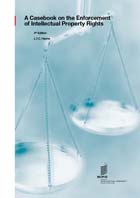
Intellectual property (IP) enforcement is the act of taking legal action when IP rights – including trademarks, copyrights, industrial designs, patents, geographical indications – and trade secrets have been infringed. The objective is to stop the infringement, prevent further violations of IP rights and remedy the prejudice caused by these actions.
IP rights are valuable assets for businesses and individuals, providing protection for innovative ideas, technology solutions, brands, and creative works. Merely obtaining IP rights can not guarantee they will not be infringed. Enforcement of these IP rights is crucial for the success of innovators, entrepreneurs and creators.


Part III of the Agreement on Trade-Related Aspects of Intellectual Property Rights (TRIPS Agreement) sets the minimum legal standards in relation to IP enforcement. Members of the World Trade Organization (WTO) are free to determine the method of implementing the provisions of the TRIPS Agreement within their own legal systems to achieve an appropriate balance between private and public interests.
The civil and criminal remedies in the TRIPS Agreement include provisional measures (Provisional measures are temporary actions taken by a court or administrative authority before a final decision is issued. They seek to prevent IP rights infringement from occurring, such as preventing infringing goods from entering the market, or to preserve evidence concerning an alleged infringement), civil and administrative procedures (Civil and administrative procedures and remedies are legal mechanisms and remedies to address IP infringements before civil and administrative authorities), border measures (Border measures involve taking action at the border to stop infringing goods and prevent their release into the market), and criminal procedures and penalties (Criminal procedures and penalties are legal mechanisms to address IP crime, especially trademark counterfeiting and copyright piracy).
Visit the global WIPO Lex Database to access legal information on IP enforcement, including IP laws and regulations, WIPO-administered and IP related treaties, and leading judicial decisions.
Visit the Internet Sources for Intellectual Property Case Law to access a non-exhaustive compilation of links to online databases that contain decisions or extracts of such decisions in the field of intellectual property law.